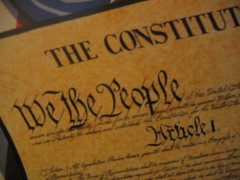Commentary: Freedom of Thought
I have a friend named Mike who recently took his citizenship test in order to become a full-fledged American. Mike has lived and worked in the United States for nearly 15 years, he has a green card, he is married to an American woman and they have two small boys. He has been preparing for his citizenship test for the last couple of months, and this past week, as we traveled to visit a client together in North Carolina, he started telling me about the various topics he needed to master in order to pass the test. Essentially, Mike needs to answer ten random American history and trivia questions correctly, but the ten questions are from a pool of about one hundred he was given to learn by those ‘in the know’ about the test. Now, the questions aren’t trivial per se, for example, they don’t include queries such as “Who is the father of Britney Spears first child?” but they do include the question “What are the colors of the American Flag?” Not all of the questions are so simple, however, and as Mike started testing the depth of my own historical character, the examination became tougher and tougher. When he asked me, “What is the definition of the Constitution?” I fumbled and then I answered with the following: “Aren’t they the Amendments?” He answered that they were…sort of. And then he told me that the “formal,” “final answer” definition of the Constitution of the United States was as follows: "It is The Supreme Rule of Law.”
I have been thinking about this Supreme Law, and wondering how much certainty one has to have in their beliefs in order to proclaim them “supreme.” It never occurred to me that the “Supreme” Court was upholding “the Supreme Rule of Law,” rather, I assumed that 'Supreme' was simply the highest level one could go—in the same way that “ultra deluxe” in household detergent or “upper class” in airplanes or “extreme” in sports is used.
Essentially, the Supreme Court’s primary function is to uphold the Supreme Rules of Laws, laws that for the most part, were written in 1791, when slavery still existed and women couldn’t vote. Those amendments were ratified into the constitution decades and centuries later. I fully understand the need for our amendments. Sadly, telling people not to lie, not to steal and to be nice as often as possible isn’t necessarily going to compel them to behave this way. But in analyzing the need for a Constitution, I couldn’t help but be struck by some non-sequitors. The Constitution is supposed to uphold the rights of all the Americans in this country. But in order to do that, it seems that we must either force everyone that doesn’t believe in the “Supreme Rules of Law” to see the reality the way we see it or to punish them in order to protect those laws. What I don’t understand is how or why we determined that our Laws were indeed “Supreme”? How can we be sure that this is indeed the way that everyone should live and behave?
Let’s consider the First Amendment to the Constitution. Most everyone knows that it signifies the right of free speech, but it includes quite a lot more. I’d like to share it with you:
Congress shall make no law respecting an establishment of religion, or prohibiting the free exercise thereof; or abridging the freedom of speech, or of the press; or the right of the people peaceably to assemble, and to petition the Government for a redress of grievances.
This very first amendment gives us not only freedom of speech, it also gives us freedom of thought. So why are we so obsessed with getting everyone to think they way WE want them to think. So despite the fact that we all have the right to privacy we are still fighting over who can marry who. This truly puzzles me.
Today, a new movie is opening; it is called The DaVinci Code, and it is based on a book written by Dan Brown. This is a book that has sold over 40 million copies, and it is still selling. I have read the book, and despite hoping not to, I thought it was really interesting. Some people feel differently, and the film's release has apparently sparked protests around the world. This is because of the book’s plot, which revolves around a church conspiracy to hide the authors fictional claim that Jesus and Mary Magdalene married and had children. Protestors have included Jews Against Anti-Christian Defamation, the Culture and Family Institute, Concerned Women of America, The Catholic Family, The Human Rights Institute, Human Life International, Cardinal Newman Society; Indian Catholic nuns prayed at a protest rally in Mumbai on Tuesday, and after Indian censors cleared the film for public viewing, Catholic activist Joseph Dias began a hunger strike, promising to "fast unto death" unless the censors reverse their decision.
With everything going on in the world, I am astounded that people find it necessary to protest a movie! Sony and the producers of the film have as much a right to articulate their beliefs, whether they are fiction or not, and are protected by the Constitution to do so. Why do some people feel it necessary for all of mankind to believe the same exact thing? Isn’t it more fortuitous to be able to challenge and evolve beliefs? Think about it: if no one had challenged Copernicus, we would still believe that the earth was the center of the Universe!
The first ten amendments to the Constitution are called the Bill of Rights, and as I read through them this week I got confused and befuddled by some of the legalese, and I couldn’t help but wonder how it all got so dense. And the following occurred to me: while our constitution is a collection of the supreme laws of the U.S., they are not the Supreme Laws of the Universe. I think we have yet to discover those. So as we search for our profound answers and meaning, I hold out hope that it will one day be possible for mankind to live with dignity and kindness, and that our universal constitution will be the constitution of our spirit, not the constitution of our courts.
I have been thinking about this Supreme Law, and wondering how much certainty one has to have in their beliefs in order to proclaim them “supreme.” It never occurred to me that the “Supreme” Court was upholding “the Supreme Rule of Law,” rather, I assumed that 'Supreme' was simply the highest level one could go—in the same way that “ultra deluxe” in household detergent or “upper class” in airplanes or “extreme” in sports is used.
Essentially, the Supreme Court’s primary function is to uphold the Supreme Rules of Laws, laws that for the most part, were written in 1791, when slavery still existed and women couldn’t vote. Those amendments were ratified into the constitution decades and centuries later. I fully understand the need for our amendments. Sadly, telling people not to lie, not to steal and to be nice as often as possible isn’t necessarily going to compel them to behave this way. But in analyzing the need for a Constitution, I couldn’t help but be struck by some non-sequitors. The Constitution is supposed to uphold the rights of all the Americans in this country. But in order to do that, it seems that we must either force everyone that doesn’t believe in the “Supreme Rules of Law” to see the reality the way we see it or to punish them in order to protect those laws. What I don’t understand is how or why we determined that our Laws were indeed “Supreme”? How can we be sure that this is indeed the way that everyone should live and behave?
Let’s consider the First Amendment to the Constitution. Most everyone knows that it signifies the right of free speech, but it includes quite a lot more. I’d like to share it with you:
Congress shall make no law respecting an establishment of religion, or prohibiting the free exercise thereof; or abridging the freedom of speech, or of the press; or the right of the people peaceably to assemble, and to petition the Government for a redress of grievances.
This very first amendment gives us not only freedom of speech, it also gives us freedom of thought. So why are we so obsessed with getting everyone to think they way WE want them to think. So despite the fact that we all have the right to privacy we are still fighting over who can marry who. This truly puzzles me.
Today, a new movie is opening; it is called The DaVinci Code, and it is based on a book written by Dan Brown. This is a book that has sold over 40 million copies, and it is still selling. I have read the book, and despite hoping not to, I thought it was really interesting. Some people feel differently, and the film's release has apparently sparked protests around the world. This is because of the book’s plot, which revolves around a church conspiracy to hide the authors fictional claim that Jesus and Mary Magdalene married and had children. Protestors have included Jews Against Anti-Christian Defamation, the Culture and Family Institute, Concerned Women of America, The Catholic Family, The Human Rights Institute, Human Life International, Cardinal Newman Society; Indian Catholic nuns prayed at a protest rally in Mumbai on Tuesday, and after Indian censors cleared the film for public viewing, Catholic activist Joseph Dias began a hunger strike, promising to "fast unto death" unless the censors reverse their decision.
With everything going on in the world, I am astounded that people find it necessary to protest a movie! Sony and the producers of the film have as much a right to articulate their beliefs, whether they are fiction or not, and are protected by the Constitution to do so. Why do some people feel it necessary for all of mankind to believe the same exact thing? Isn’t it more fortuitous to be able to challenge and evolve beliefs? Think about it: if no one had challenged Copernicus, we would still believe that the earth was the center of the Universe!
The first ten amendments to the Constitution are called the Bill of Rights, and as I read through them this week I got confused and befuddled by some of the legalese, and I couldn’t help but wonder how it all got so dense. And the following occurred to me: while our constitution is a collection of the supreme laws of the U.S., they are not the Supreme Laws of the Universe. I think we have yet to discover those. So as we search for our profound answers and meaning, I hold out hope that it will one day be possible for mankind to live with dignity and kindness, and that our universal constitution will be the constitution of our spirit, not the constitution of our courts.



















0 Comments:
Post a Comment
<< Home